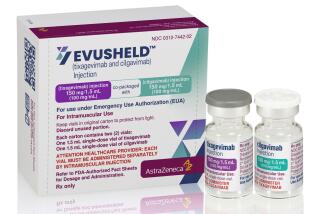FDA OKs AIDS Drug That Can Prolong Patients’ Lives : New Medicine Not a Cure, but Eases Symptoms
- Share via
WASHINGTON — The first drug shown to prolong the lives of AIDS sufferers won federal approval today for prescription use in the United States.
Azidothymidine, better known as AZT, is not represented as a cure for the deadly disease, but clinical trials last fall convinced officials that it does prolong life and reduce symptoms in some AIDS patients.
Noting that it is the only treatment proven to offer even that relief, a Food and Drug Administration advisory panel concluded in January that AZT should be approved despite some serious side effects.
Today’s final FDA approval, announced by Robert E. Windom, assistant secretary of health at the Department of Health and Human Services, had been widely expected.
‘Important Step’
“Today’s approval marks an important step, but by no means a final victory, in our ongoing war against AIDS,” Windom said.
The drug, made by Burroughs Wellcome Co. of Research Triangle Park, N.C., is already being given to about 4,500 patients under a special treatment plan approved by the FDA after the clinical trials were so promising.
Those trials were stopped earlier than scheduled when the FDA agreed that AZT had demonstrated enough beneficial effect to make it immoral to continue denying the drug to those patients in the study who were receiving a placebo.
Medical experts are careful to emphasize that AZT is not a cure for AIDS, because tests have shown it does not kill the AIDS virus.
Outcome Uncertain
How long it may be able to prolong the lives of AIDS sufferers is unknown because no one started taking it until last year. Some people have died even while taking AZT, but a majority have shown marked improvement--to the point that some seriously ill patients were able to return to work and resume other daily activities.
One of the arguments for approving AZT is that it might keep thousands of patients alive until a cure is found.
Burroughs Wellcome Co. officials told a House subcommittee earlier this month that they expect the annual cost of AZT--to be sold under the trade name Retrovir--for a typical patient to range between $7,000 and $10,000.
While acknowledging that AZT is expensive, the company has pointed out that some other rare drugs--including one used to fight rejection of transplanted organs--also are quite costly.
Moreover, they suggest, the annual cost of the drug will be less in many cases than the cost of extensive hospitalization required for many AIDS patients without AZT.
Because of a short supply of the drug, Windom said distribution of Retrovir will be limited initially to patients for whom it is indicated under the approved labeling, including AIDS patients and patients with specific laboratory evidence of severely depressed immunity (AIDS-related complex) or a history of pneumocystis carinni pneumonia, a rare form of pneumonia found mostly in people with AIDS.
More to Read
Sign up for Essential California
The most important California stories and recommendations in your inbox every morning.
You may occasionally receive promotional content from the Los Angeles Times.













